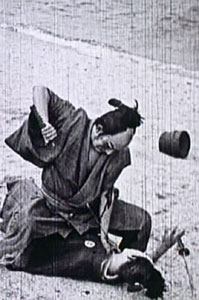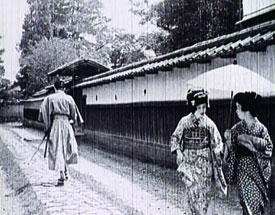 Gyakuryu (Backward Current; aka, Back Stream; or Backward Flow, Toe Tojin, 1924) is the earliest of the great action star Tsusaburo "Bantsuma" Bando's films to survive; or, well, twenty-eight minutes of its original six reels survive.
Gyakuryu (Backward Current; aka, Back Stream; or Backward Flow, Toe Tojin, 1924) is the earliest of the great action star Tsusaburo "Bantsuma" Bando's films to survive; or, well, twenty-eight minutes of its original six reels survive.
These twenty-eight minutes are sufficient to convey its story, & its significance as the precursor to all nihilistic samurai films to follow. It is available on dvd with subtitles which translate the benshi narrator (Midori Futagawa) explaining the story in an excitable manner.
A benshi would've attended silent film showings in their day, so it's an authentic touch to make this a "talking silent," though to some degree one has to disregard the benshi in favor of what the screen, & Bantsuma's acting in particular, is revealing.
Bantsuma, young, slim, & so expressive in his gaze, stars as the naive low-ranking vassal Mikiaburo Nanjo, who comes to grief due to the chief retainer's son (Kanzaburo Arashi).
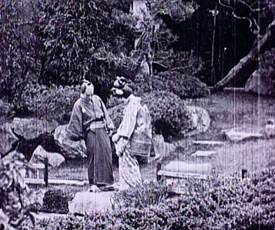 Mikiaburo's mother (Yoshie Nakagawa) is killed in a brutal accident that might easily have been avoided. His sister Otomi (Reiko Shimizu) is raped & commits suicide. Mikiaburo's mother (Yoshie Nakagawa) is killed in a brutal accident that might easily have been avoided. His sister Otomi (Reiko Shimizu) is raped & commits suicide.
The last star for him is when the girl Misao (Tomoko Makino), whom Mikiaburo wholeheartedly loves, has fallen in love with the villain Genzaburo (Kozaburo Kataoka).
Influenced by American style of storytelling rather than the benshi-narrated style, Gyakuryu has a tone of nihilism that would afterward remain paramount of Japan's most serious & artful films.
Terrible things happen in Mikiaburo's one after another, for a tone of abject grief & the horror of life's injustices.
After he humiliates himself trying to break up the wedding ceremony & claim Misao as his own, he is beaten & cast out of the clan to live thereafter as a ronin or masterless samurai.
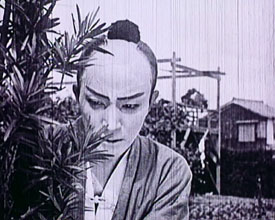 For years he broods & struggles to survive, sinking into an angrier & angrier depression, never bathing, & carrying a festering grudge. For years he broods & struggles to survive, sinking into an angrier & angrier depression, never bathing, & carrying a festering grudge.
One drunken day he sees Misao & her fortunate, undeserving husband on a happy outing with servants & guards, He staggers toward the beach, sword drawn, unable to control his rage.
The seashore serves as a symbolic backdrop as well as a pictorial one, & was copied in a great many films thereafter, becoming especially associated with the duel between Kojiro Sasaki & Miyamoto Musashi.
He engages battle against the chief retainer's son & his guards, as Misao looks on in terror & even draws a tanto knife to protect herself from the madman.
Even this early in his film career, Bantsuma's individualistic style of fight choreography is in place.
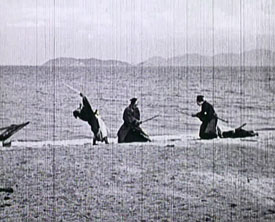 Whether playing a noble skillful samurai, or a "natural" swordsman with imperfect stance & posture, the secret of Bantsuma's seeming invulnerability seems to be where he "looks" as he kills. Whether playing a noble skillful samurai, or a "natural" swordsman with imperfect stance & posture, the secret of Bantsuma's seeming invulnerability seems to be where he "looks" as he kills.
He rarely gazes at the man he is killing, but sizes him up & as the sword strikes, he is already facing another direction, sizing up his next victim.
Once one understands this "key" to Bantsuma's method, a lot of what makes his action scenes so amazing gains a deeper clarity, & it's something rarely seen in cinematic choreography, though the classic Sword of Doom (Daibosutse toge, ) has Tatsuya Nakadai using a "glances away" technique that fools oponents, whether one or many, into a false belief that he has opened himiself to defeat.
Our nihilistic anti-hero kills everyone in sight, including the girl, with very little sense of justice in any of it, even allowing the sadistic abuses he formerly endured.
This tragic monster who horrifies us at the end is in stark contrast to the naive young samurai we met at the beginning. Gyakuryu possesses extraordinary power to disturb even today, even in the fragmentary state of what survives.
The dvd release packages Gyakuryu along with Orochi (Serpent, 1925), a very well matched pair of nihilistic tragedic action pictures, both starring Bantsuma, both directed by Buntaro Futagawa.
copyright © by Paghat the Ratgirl
|
